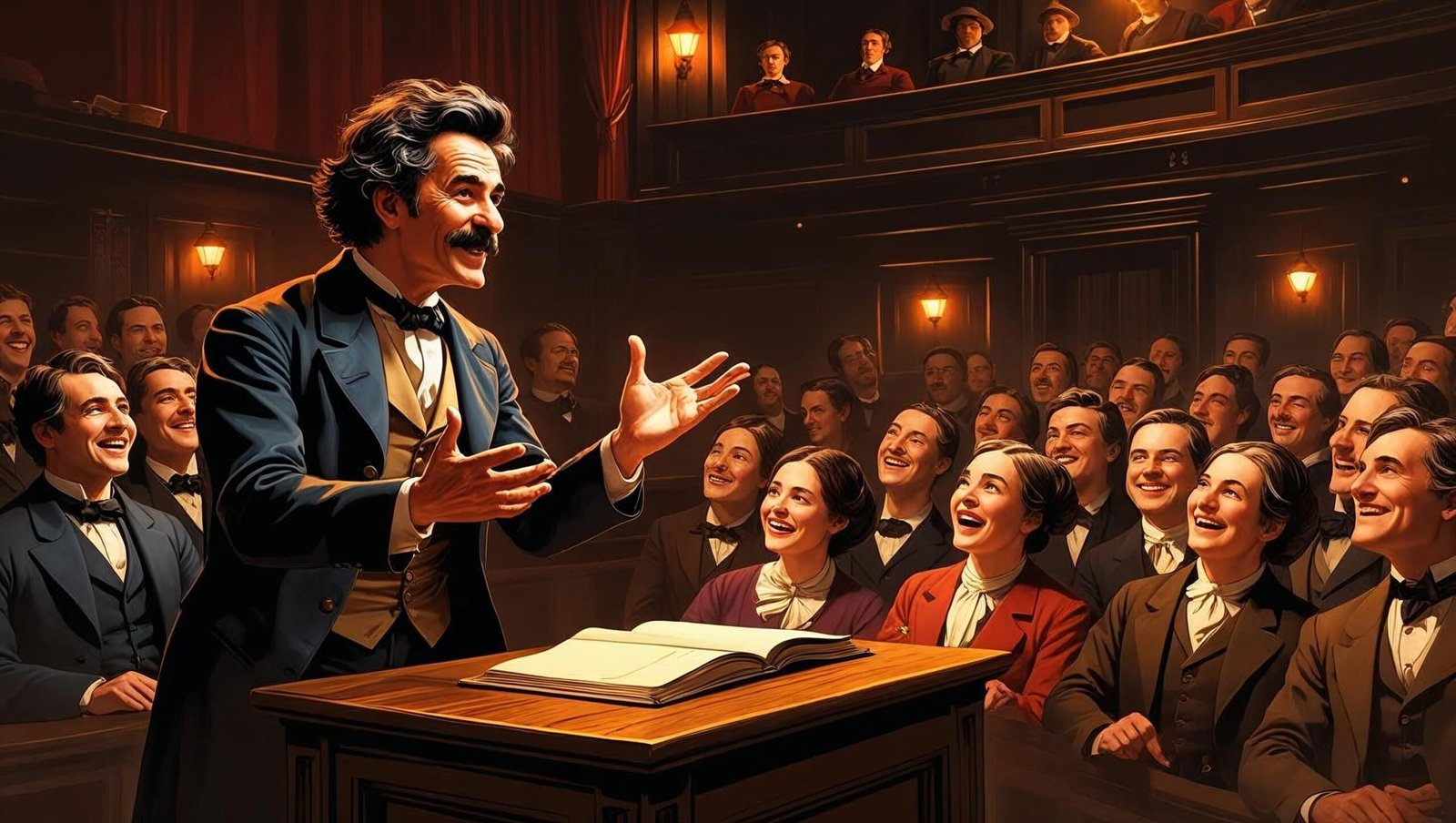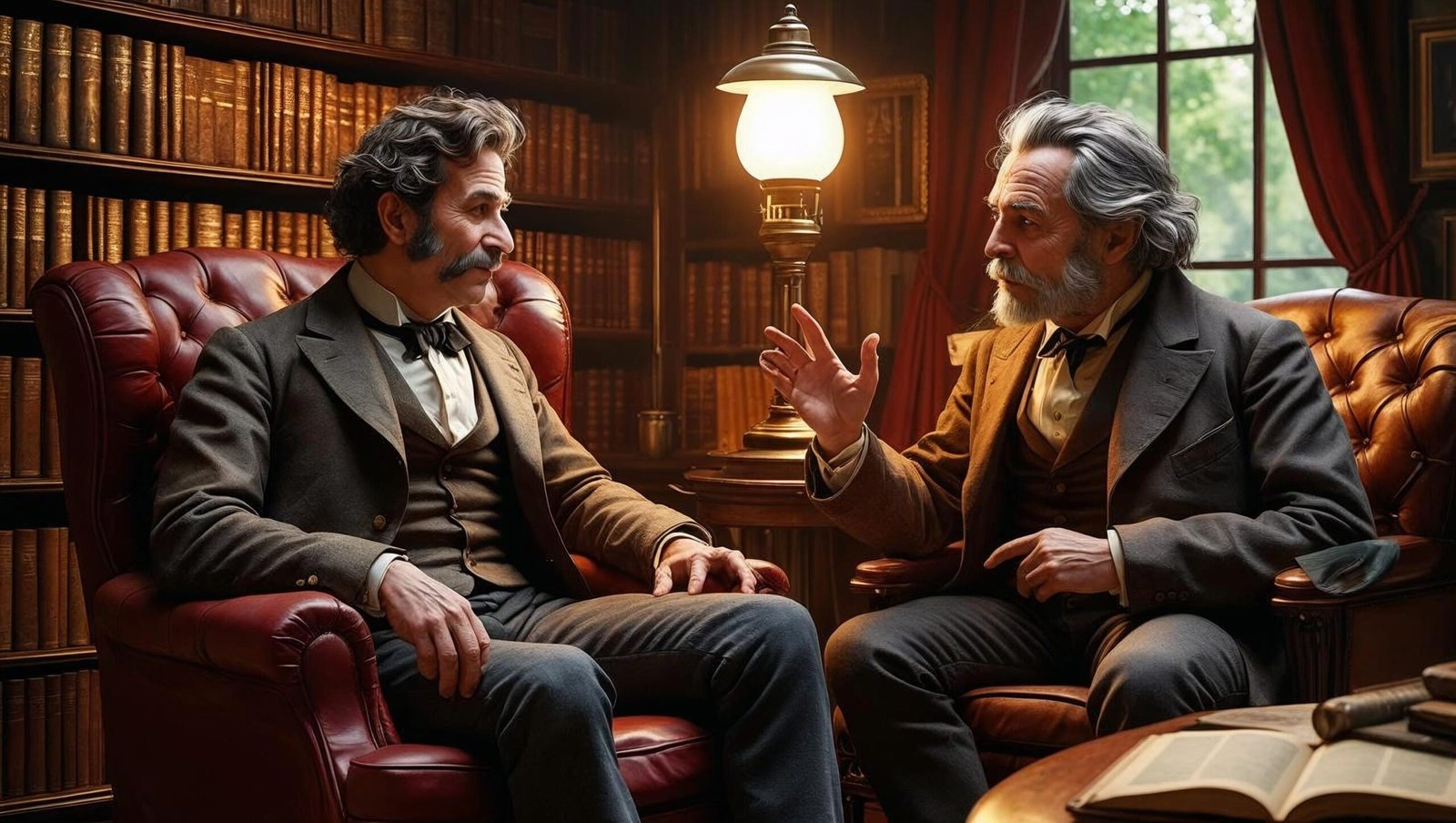Mark Twain Ron Chernow Book Summary: 7 Fascinating Truths That Will Captivate Your Mind
Introduction
When a biographer of Ron Chernow’s calibre turns his attention to an American icon like Mark Twain, the result is bound to be exceptional. Known for his sweeping, meticulously researched works on historical figures such as Alexander Hamilton, George Washington, and Ulysses S. Grant, Chernow approaches Twain with the same rigorous attention to fact and human complexity. The Mark Twain Ron Chernow book summary is not merely a retelling of events from Twain’s life; it is an exploration of the man behind the pen, revealing his genius, contradictions, struggles, and triumphs.
This work paints a vivid picture of Samuel Langhorne Clemens—better known as Mark Twain—through the lens of his humour, sharp social commentary, restless travels, and turbulent personal affairs. Chernow’s biography goes far beyond the surface image of the witty storyteller, offering an intimate and layered portrait of a man who helped define American literature.

1. The Scope and Depth of Chernow’s Approach
Ron Chernow is not content to offer a superficial outline of Twain’s life. In this Mark Twain Ron Chernow book summary, one finds a blend of narrative richness and scholarly precision. Chernow weaves Twain’s childhood in Hannibal, Missouri, his adventures as a riverboat pilot on the Mississippi, and his restless journeys across continents into a coherent, almost cinematic narrative.
The author’s talent lies in balancing historical detail with human emotion. Every anecdote, whether humorous or tragic, serves to illuminate some facet of Twain’s character. Chernow’s prose captures not only the public figure celebrated for The Adventures of Tom Sawyer and Adventures of Huckleberry Finn, but also the man plagued by financial ruin, personal loss, and moral self-questioning.
2. Early Life and Formative Influences
In the Mark Twain Ron Chernow book summary, considerable attention is given to Twain’s early years. Born in 1835 in the small town of Florida, Missouri, Samuel Clemens grew up during a time of deep social and political transformation in America. His boyhood in Hannibal became the seedbed for much of his later fiction. Chernow carefully outlines the cultural, economic, and racial dynamics of the antebellum South, demonstrating how they shaped Twain’s worldview.
Twain’s fascination with the Mississippi River was more than a youthful obsession; it became a symbol of freedom, adventure, and the restless American spirit. The biography details how this passion drew him into the world of steamboats, an experience that would later form the backbone of his memoir Life on the Mississippi. Chernow shows how these early experiences became integral to Twain’s literary voice.
3. The Making of a Literary Legend
The Mark Twain Ron Chernow book summary reveals how Clemens transformed into Mark Twain, a pseudonym taken from riverboat terminology meaning “two fathoms deep.” This was more than a catchy pen name—it was a declaration of identity. Chernow traces Twain’s evolution from newspaper reporter to celebrated author, charting the publication of his most famous works.
Chernow explains how Twain’s humour was more than entertainment; it was a form of cultural critique. Through satire, Twain exposed the absurdities of social pretensions, political hypocrisy, and racial injustice. His works resonated because they were deeply rooted in authentic human experience, yet bold enough to challenge prevailing norms.
4. Personal Struggles Behind the Public Image
What makes the Mark Twain Ron Chernow book summary so compelling is Chernow’s refusal to gloss over Twain’s personal difficulties. Twain was often torn between his desire for financial stability and his appetite for risky investments, many of which ended in disaster. His ventures into publishing and speculative technology drained his resources, forcing him into relentless lecture tours to pay off debts.
The biography also delves into the emotional toll of personal tragedies, including the death of his wife, Olivia Langdon Clemens, and several of their children. Chernow portrays a man whose humour often masked profound sorrow and self-doubt.
5. Twain’s Political and Social Views
A striking feature of the Mark Twain Ron Chernow book summary is its examination of Twain’s evolving political and social consciousness. Chernow presents Twain as a man deeply aware of injustice, particularly concerning race and imperialism. While Twain’s early writings sometimes reflected the prejudices of his time, his later years showed an increasingly sharp critique of colonialism, institutional racism, and political corruption.
Through speeches, essays, and novels, Twain championed the cause of freedom and human dignity. Chernow situates Twain within the broader political currents of the late 19th and early 20th centuries, showing how his voice both reflected and challenged American society.

6. Legacy and Cultural Impact
The Mark Twain Ron Chernow book summary underscores Twain’s enduring influence on literature and culture. Chernow argues that Twain was not only a literary craftsman but also a cultural phenomenon—a man whose wit and wisdom shaped the American imagination. His works continue to be studied, quoted, and adapted, proving that his voice remains relevant in modern times.
Twain’s ability to balance entertainment with moral insight ensured his place among the greats. Chernow closes the biography with a reflection on how Twain’s contradictions—his humour alongside his melancholy, his optimism alongside his disillusionment—make him an eternally fascinating subject.
7. Chernow’s Distinctive Contribution
Ron Chernow’s biography stands apart from previous works on Twain because of its depth, balance, and narrative elegance. In the Mark Twain Ron Chernow book summary, readers gain both a panoramic and intimate view of the author’s life. Chernow’s meticulous research, combined with his gift for storytelling, makes this book an invaluable resource for anyone seeking to understand not only Twain the writer but also Twain the man.
By refusing to romanticize or vilify his subject, Chernow achieves a nuanced portrait—one that honours Twain’s genius while acknowledging his flaws.
8. Twain’s Relationship with the Press and Public Opinion
In the Mark Twain Ron Chernow book summary, one cannot ignore Twain’s complicated relationship with the press and his readership. Chernow meticulously describes how Twain both courted and deflected public attention. On one hand, Twain thrived on the fame his works brought him, using publicity tours and lectures to sustain his financial health. On the other, he bristled under the constant scrutiny of journalists and critics.
Chernow presents a particularly insightful analysis of Twain’s sensitivity to reviews. While outwardly projecting confidence, Twain was deeply affected by harsh criticism. This duality—confidence mixed with vulnerability—is one of the recurring themes in the Mark Twain Ron Chernow book summary. It illustrates how even literary giants are not immune to the sharp sting of public opinion.
9. The Literary Craft and Stylistic Brilliance
One of the most captivating elements in the Mark Twain Ron Chernow book summary is Chernow’s appreciation for Twain’s craft. Twain had an extraordinary ear for dialogue, capable of capturing regional accents, colloquialisms, and the rhythms of everyday speech. This skill lent his works an authenticity that continues to engage readers.
Chernow underscores Twain’s mastery of irony and satire, tools he wielded with precision to comment on societal absurdities. For example, in The Adventures of Huckleberry Finn, Twain’s use of a child narrator allowed him to question moral hypocrisy without direct authorial intrusion. The Mark Twain Ron Chernow book summary makes it clear that this stylistic choice was a calculated move to challenge readers subtly but effectively.

10. Twain as a Lecturer and Public Speaker
Beyond his books, Twain was a formidable presence on the lecture circuit. The Mark Twain Ron Chernow book summary dedicates significant space to his speaking career, which became a vital source of income, especially during times of financial hardship. Twain’s lectures were a unique blend of humour, anecdote, and social commentary, delivered in a conversational style that captivated audiences across America and Europe.
Chernow notes that these lectures were more than entertainment—they were an extension of Twain’s literary voice. The biography reveals how Twain carefully crafted his performances, often rehearsing extensively to achieve an appearance of spontaneity.
11. Travels and the Formation of a Global Perspective
The Mark Twain Ron Chernow book summary also chronicles Twain’s extensive travels, which greatly influenced his worldview. From Europe to the Middle East, Twain’s journeys expanded his understanding of cultural diversity and human nature. Chernow draws connections between Twain’s travel writings, such as The Innocents Abroad, and his growing scepticism toward imperialism.
Through these experiences, Twain developed a sharper critical lens on America’s role in global affairs. This broadened perspective would later inform his essays and speeches, cementing his reputation as not just a humourist but also a serious social critic.
12. Chernow’s Handling of Controversial Aspects
An important merit of the Mark Twain Ron Chernow book summary is Chernow’s willingness to confront controversial elements of Twain’s life and work. This includes addressing racial language in Twain’s novels and the evolving interpretations of his writing in modern contexts. Chernow approaches these issues with nuance, neither dismissing the historical realities of Twain’s time nor ignoring the discomfort such content can evoke today.
By doing so, Chernow provides readers with the tools to appreciate Twain’s artistry while engaging in thoughtful critique—a balance that many biographical works fail to achieve.
13. Twain’s Circle of Friends and Literary Peers
The Mark Twain Ron Chernow book summary offers fascinating glimpses into Twain’s relationships with other prominent figures of his era. Twain moved in literary and social circles that included William Dean Howells, Harriet Beecher Stowe, and even industrial magnates. Chernow illustrates how these interactions shaped Twain’s thinking and sometimes influenced his creative decisions.
These friendships also reveal Twain’s multifaceted personality: charming and convivial in some settings, sharp-tongued and unyielding in others. Chernow captures the complexity of a man who could be both a loyal friend and an unforgiving critic.

14. Financial Turmoil and Lessons in Resilience
Financial instability was a constant shadow over Twain’s life. The Mark Twain Ron Chernow book summary recounts how ill-fated investments, including a disastrous printing press venture, pushed Twain into bankruptcy. Yet, rather than succumb to despair, Twain embarked on an ambitious world lecture tour to repay his debts—a journey that took a significant toll on his health but restored his financial standing.
Chernow frames this period as a testament to Twain’s resilience and sense of honour. It is one of the biography’s most inspiring segments, showing how determination can prevail over even the gravest setbacks.
15. Reception and Legacy of Chernow’s Biography
Since its release, Chernow’s biography has been widely praised for its depth and narrative elegance. The Mark Twain Ron Chernow book summary has become a valuable resource for both scholars and casual readers, offering a definitive portrait of one of America’s greatest literary voices. Critics have lauded Chernow’s ability to humanize Twain without diminishing his achievements.
This reception affirms Chernow’s status as one of the finest biographers of our time—a writer who can bring historical figures to life with authenticity and empathy.
16. Why This Biography Matters Today
The Mark Twain Ron Chernow book summary is not just a historical account; it is a mirror reflecting timeless human themes. Twain’s struggles with identity, ambition, failure, and public perception resonate strongly in the modern age. Chernow’s portrayal encourages readers to see beyond the surface of fame and consider the personal costs that often accompany it.
In a world where public figures are constantly under scrutiny, Twain’s story offers a poignant reminder of the complexity behind public personas.
17. Key Takeaways for Modern Readers
From the Mark Twain Ron Chernow book summary, modern readers can glean several lessons:
-
Humour as Resistance – Twain’s wit was not frivolous; it was a tool for challenging authority and exposing hypocrisy.
-
Adaptability – Twain’s ability to reinvent himself during financial crises is a model of resilience.
-
Global Awareness – Travel broadened Twain’s perspective and deepened his empathy, qualities as vital today as they were in his time.
-
Embracing Complexity – Like Twain, we can acknowledge our contradictions without allowing them to diminish our worth.

18. The Enduring Relevance of Twain’s Moral Vision
Even over a century after his death, Twain’s works continue to provoke thought and stir emotion. The Mark Twain Ron Chernow book summary makes it clear that Twain’s moral vision was both timeless and radical for its day. His insistence on speaking uncomfortable truths—whether about racial injustice, political corruption, or human vanity—still resonates in an era grappling with many of the same issues.
Chernow’s narrative invites readers to consider how Twain’s satirical lens might interpret today’s challenges. Would he lampoon modern political discourse? Would he critique our technological obsessions? In reflecting on these questions, the Mark Twain Ron Chernow book summary subtly reminds us that Twain’s genius lay in his ability to confront uncomfortable realities while keeping his audience engaged and entertained.
This is precisely why Chernow’s portrayal is so vital: it preserves not just the events of Twain’s life but the spirit of his work. In doing so, it ensures that future generations will continue to see Twain not merely as a figure of the past, but as a voice whose humour, wisdom, and courage remain indispensable.
Frequently Asked Questions (FAQs)
Q1: What is the main focus of the Mark Twain Ron Chernow book summary?
The main focus is to present Twain as a multifaceted individual—humorous yet melancholic, a cultural icon yet a man beset by personal and financial struggles.
Q2: Does Ron Chernow’s biography offer new insights into Mark Twain’s life?
Yes. Chernow integrates extensive archival research, offering fresh perspectives on Twain’s personal relationships, political views, and financial misadventures.
Q3: Is the Mark Twain Ron Chernow book summary suitable for casual readers or only scholars?
It is accessible to both. Chernow writes in a style that blends scholarly detail with engaging narrative, making it appealing to general readers and academics alike.
Q4: How does Chernow’s portrayal of Twain differ from previous biographers?
Chernow avoids overly romanticized portrayals, focusing instead on the balance between Twain’s humour and his often troubled private life.
Q5: What lessons can modern readers draw from this biography?
Lessons include the value of resilience in adversity, the power of wit in social critique, and the importance of embracing life’s contradictions.
Conclusion
The Mark Twain Ron Chernow book summary stands as a testament to Ron Chernow’s unmatched skill as a biographer and to Mark Twain’s enduring significance in American letters. Through exhaustive research and evocative prose, Chernow captures the man behind the legend—a writer whose humour, courage, and humanity continue to resonate across generations.
By unearthing the contradictions that defined Twain’s life, Chernow not only enriches our understanding of the author but also invites us to reflect on the complexities within ourselves. Whether you are a devoted Twain enthusiast or a newcomer to his works, this biography offers a journey worth taking—a journey into the life of a man whose words continue to captivate, challenge, and inspire.
Comments:
This in-depth review of the Mark Twain Ron Chernow book summary is published by shubhanshuinsights.com — your destination for insightful book analyses and timeless literary reflections.
May this Mark Twain Ron Chernow book summary inspire readers to explore deeper, think critically, and cherish the enduring power of timeless literature.